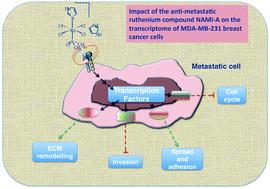RNA-seq analysis of the whole transcriptome of MDA-MB-231 mammary carcinoma cells exposed to the antimetastatic drug NAMI-A†
Abstract
Gene expression profiling has been introduced into drug development to understand the activity of chemical entities in pre-clinical settings. The present study investigates the changes induced in gene expression by the ruthenium-based compound NAMI-A. The genes differentially expressed by NAMI-A are evaluated through whole-transcriptome analysis and RNA-sequencing in the metastatic MDA-MB-231 mammary carcinoma cells, in comparison to the non-tumorigenic HBL-100 mammary gland cells. NAMI-A treatment rapidly induces a relevant gene up-regulation that quickly returns to normal values. These changes differ between MDA-MB-231 and HBL-100 cells, highlighting the selectivity of the NAMI-A induced transcriptional perturbation in the invasive rather than in the non-tumorigenic cells. The transcriptional response, in the invasive MDA-MB-231 cells, comprises a set of early-response transcription factors and reveals a pharmacological signature in good agreement with the most peculiar NAMI-A behavior as a metastasis inhibitor such as cell cycle regulation and ECM remodeling. Globally, the results of this study indicate some transcription factors influencing the expression and activity of many downstream genes and proteins fundamentally involved in the functional effects of NAMI-A in vitro and in vivo.


 Please wait while we load your content...
Please wait while we load your content...